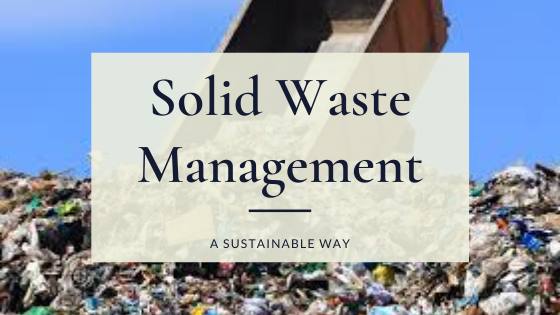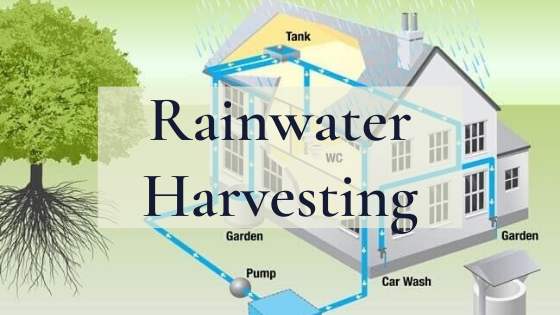
Solid Waste Management is used to describe the wastes like the solid and semi-solid materials that are discarded by a community. The solid waste generated through various domestic, commercial, constructional and industrial activities. The safe disposal of the solid waste was not a problem until the population is very small but as the population is increasing day by day then solid waste management had become the issue of threatening to human lives and also the management of this waste had become difficult in modern times.
Types of Solid Waste
Residential Waste:
- It is the waste which is generated through the domestic activities of the people living in a society.
- It can be minimised by proper solid waste management.
- It contains food wastes, cardboard, paper, glass and rubber materials.
- This type of waste is generated by the single and the multifamily dwellings.
Industrial Waste
- The solid waste which is generated by the industries is termed as the Industrial Waste.
- The industrial waste is disposed of by the industries in canals, water sources or in open areas sometimes.
- It contains housekeeping wastes, packaging, food wastes, and waste raw materials.
- The waste generator for this type of waste is light and heavy manufacturing, fabrications, power and mechanical sites, constructional sites.
Commercial Waste
- It is the waste which is generated through the commercial activities of the people living in a society.
- It contains paper, plastic, wood, glass, metals, hazardous wastes.
- This waste comes from the stores, hotels, restaurants, markets, offices and buildings etc.
Institutional Waste
- The solid waste which is generated by the institutions is termed as the Institutional Waste.
- It is same as the commercial waste.
- It comes from schools, hospitals, prisons, govt. Centres etc
Construction and Demolition Waste
- It is the waste which gets generated through the constructional activities.
- It contains wood, steel, concrete, dirt etc
- It comes from the new construction sites, road repairs, demolition of the buildings.
Bio-medical Waste
- The waste which gets generated through the medical activities is termed as bio-medical waste.
- It includes medicines, band-aids, injections, plastics etc
- It comes from hospitals, nursing homes, clinics, medical shops.
Municipal Waste
- The waste generated through domestic and commercial activities is classified as Municipal Waste.
- It is the waste which is disposed of by the municipal corporations and the local bodies.
- It includes street sweeping, landscape and the tree trimmings, wastes from the parks, beaches and the other areas.
- It comes from the street cleaning, landscaping, parks, other recreational areas, water and waste treatment.
Manufacturing or Processing Waste
- It is the waste which gets generated through various manufacturing and the processing activities of the industries.
- It includes scrap materials, raw materials, slays products.
- It comes from the manufacturing and the processing units, refineries, chemical plants, mineral extractions and processing.
Agriculture Waste
- This solid waste may also be generated by the agricultural activities is termed as agricultural waste.
- It includes spoiled food wastes, agricultural wastes, hazardous wastes like insecticides and pesticides etc.
- It comes from the crops, orchards, vineyards, dairies, feedlots and farms.
Management of Solid Waste in a Sustainable Way
There are different methods of solid waste management. The following are some of the recognized methods:
Sanitary Landfills
- This is one of the common methods of solid waste management.
- In this, the garbage is spread in thin layers, compresses and covered with soil or plastic foam.
- The bottom of landfill is covered with an impervious liner which is made of several layers of plastic and sand.
- This lining protects groundwater from being contaminated due to leaching or percolation.
- When the landfill gets full it is covered with layers of sand, clay, soil and gravel to prevent seepage.
Incineration
- It involves the burning of the solid wastes at a high temperature until the waste turns into ashes.
- Incinerators are made such that they do not produce a large amount of heat when burning solid wastes.
- Incineration reduces the volume of waste by 20-30 % of the original waste volume.
Recovery and Recycling
- Recovery and recycling include the process of taking useful but discarded items for next use.
- These items are processed and cleaned before further use.
- It helps in minimising energy loss due to new materials.
Composting
- In this, the biodegradable waste is allowed for degradation at a medium rate.
- Good quality and environment-friendly manure are formed from the compost and that can be used for agricultural purposes.
As we have seen that solid waste management is necessary for human health and the environment. So, we should manage solid waste in a proper way for our survival. A proper solid waste management plan will keep the environment clean and reduce health-related problems.
Also Read:

Research Students
PhD Research student